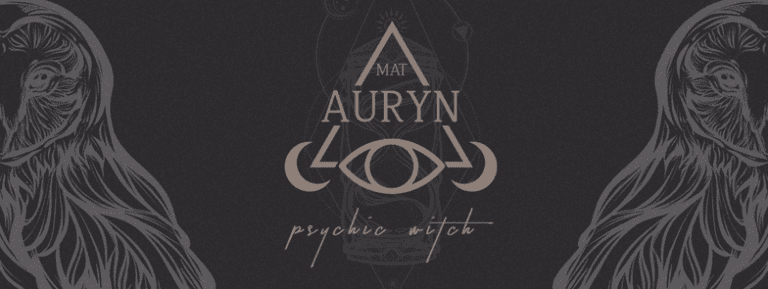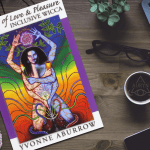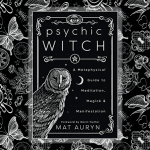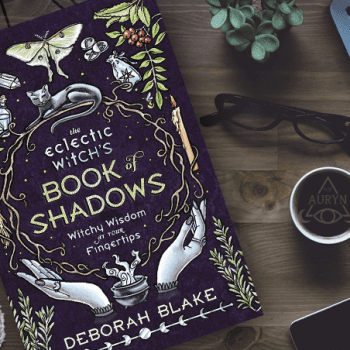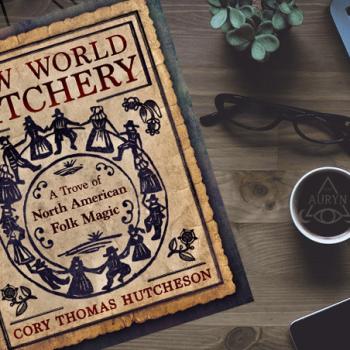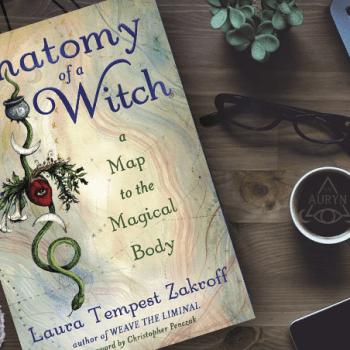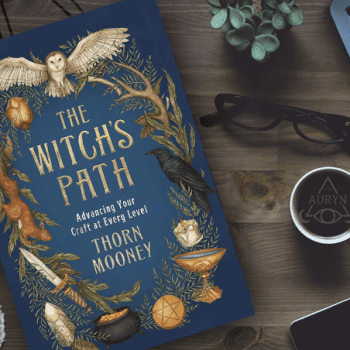Robin Artisson is the creative director of Black Malkin Press, a small, independent, and semi-respectable publishing house for certain strains of occult literature and art. He is a member of Covenant DeSavyok, a largely off-grid initiatory working group of practitioners of traditional witchcraft and sorcery. Robin is the author of “Letters from the Devil’s Forest“, “The Secret History“, “Hands of Fate“, and the very recent translation of Havamal entitled “The Words of Odin.” His earlier works included “The Witching Way of the Hollow Hill” and “The Resurrection of the Meadow.” He has authored other books, some under other (undisclosed) names. He lives in New England, in the darkest of the hillside thickets, somewhere near the ocean.
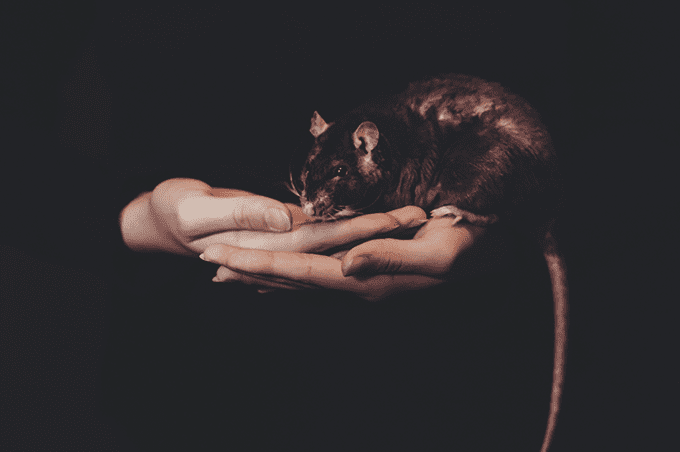
The word familiar seems to have a few definitions or describe a few type of alliances that a witch has. How do you define the familiar?
“Familiar” is primarily understood by me to refer to an other-than-human person that a witch (or sorcerer/sorceress, these terms are synonyms to “witch”) has a close, special, or strong relationship with. “Other than human person” can obviously mean more than what people call a “spirit”, but it almost always refers to a spirit. Clearly, a crow or a dog is an other-than-human person, and humans can have strong relationships with those beings, but “Familiar” conjures images of witchcraft, of people working with spirits to bring about extraordinary outcomes. So that’s where my mind goes first.
The familiar seemed to be an incorporeal being in the past and has evolved in definition in cultural perception as being a corporeal pet such as a black cat that one physically owns. Why do you think that is? How has the idea of a familiar evolved through the years?
I think the narratives that came from the pre-modern period regarding the Witch’s Familiar having the tangible form of an animal that lived with the witch is a conflation of a spiritual reality with a more easily observed ordinary reality. I think that primarily, chiefly, the familiar of any witch from history, or from the modern day, is going to be a spirit or a preternatural entity of that type.
I think the pre-industrial imagination had fewer walls between the seen and the unseen or between the rational and trans-rational, and could more readily embrace or conceive of an overlap between those two things. A woman known to be a “witch” who had cats around was going to inspire stories about her “imps” or “demons” taking the form of cats. That’s good imagination, what we might even call sensationalism these days. And yet, it’s based in something vital- a closeness between seen and unseen that we lack these days.
Hollywood and popular culture also (for modern people) have a huge role to play in how things like this are conceived of. Media is our new body of lore and story and myth, now.
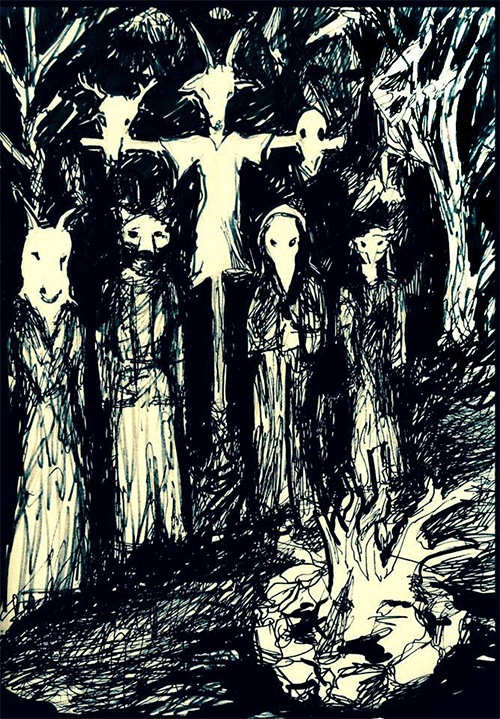
It would seem that the familiar spirit is more focused on assisting a witch with their magick or psychic abilities (such as astral travel or mediumship). Some conflate the idea of a familiar spirit with a spirit guide or an animal spirit, do you believe that they’re the same?
I think our modern “Neo” spirituality world, along with our modern attempt to make sense of the strange remains of pre-christian, interanimistic worldviews and spiritual experiences, always encounters a severe language issue. We don’t have an easily satisfying language to talk about these weird things. We’re talking about events that occurred in a world very different from our own, spiritual and immediate, sensual realities that we have little context for now.
Attempts to create words or phrases, or borrow words or phrases, are understandable. “Totem spirit”, or “animal guide” or things of that nature are fairly common. I think those of us dealing specifically with the European origin of Witchcraft, particularly pre-industrial or pre-modern witchcraft (the witchcraft of balladry and folklore) should trust the sources we have more than we do, instead of trying to grab from other cultures that might have had parallel ideas or concepts.
“Puckril” is a good example. The “Little Puck” was a term given to a familiar-servitor-teacher of witches in England. It is found alongside such titles as Magistellus, or “Little Master” and “Maumet.” These terms reveal a lot. If you understand the folkloric logic behind “pucks” or the name “Puck” at all, you suddenly have a real insight into what a little puck or a personal puck at your shoulder might mean, anthropologically and cosmologically even (so long as we keep “cosmology” more spiritually localized, as it should be.)
I and those I work with believe, from our own experiences, that there is a kind of chief entity that is attached to pretty much every human person, which acts as a kind of protector through life and a guide beyond this life, after this life ends. That entity, which we attempt to become aware of before we die, and which we attempt to relate to strongly before death, is what we’d call the real “Familiar.” It can have a human or an animal shape, or both.
“Familiar” can be extended to include any spirit, however, that you form a relationship or a pact or an agreement with. So, it may be that a person’s very personal “spirit guide” refers to that chief familiar I just mentioned, but an “animal spirit” might just refer to another spirit that a person creates a relationship with, or that comes to them wanting a relationship.
There’s no single language or rules for language governing how people talk or speak about this, so confusion is going to abound. I still think it important that people dealing with Witchcraft from a European source, or Witchcraft that emerged from the combination of European cultural lore and indigenous American forces and powers (as we see in New England) should strive to utilize language that is born in those sources. Language has power.
Can one have more than one familiar spirit?
I may have accidentally answered this in the previous question! Yes, easily. In fact, the more familiars or spiritual allies a man or woman has, the more extraordinary strength they command. The more protected they will be, and the more capable they will be of gaining what they want and need in this world.
The problem is that the “system” of relationship has natural limits. You can, if you have the capacity to do so, meet and pact with five, six, or more spirits. But you have to maintain those pacts, you have to do what you agreed to do for them. They have to benefit from relating to you, too. And that can take a lot of time and resources! So you can only have as many relationships as you can literally afford to have and maintain. The more powerful a spirit is, the more it endows you with strong alliance, the more it’s going to expect in return.
How did you begin working with familiar spirits?
Years ago, after conditioning myself for a long period of time with a technique that was shared with me for obtaining a kind of out-of-body trance state, I had an formative experience in which I left my body, descended below a body of water, and met a towering brown-skinned and naked man who had a somewhat “twisted” body, especially knobby and fleshy feet.
He gave me the power to discover or attract to my conscious awareness who the entity was that was my “chief” familiar (which I talked about above.)
Upon returning to myself from that vivid encounter, that entity was “nesting” inside of chest, creating a hot, burning feeling inside me, and for weeks, I could physically feel it inside me. After that feeling subsided, it was there in dreams at times, or invisibly present, something I was able to sense in my field of sensation. We talked, we created the way forward for ourselves, which I’m still following. It was that entity that (even to this day) acted as a sort of way-shower for me, when I achieved or attempted to achieve departure-level trance states. It took me to places where other non-human entities appeared to live, so that I could make agreements or relationships with them.
This would be what the traditional, historical (even dictionary) definition of “witchcraft” is all about- humans doing extraordinary things by the aid of familiars.
Can you share a story of how a familiar spirit has assisted you or your magick in the past, something that really sticks out in your mind?
The chief familiar has a special interest in protecting you, because that’s part of it’s main role in your life-story. All familiars that you are on good terms with have a concern for your safety, because they benefit from what you do for them, as much as you benefit from what they do for you.
So, the first time I was ever in a traffic accident, my chest began to burn and I began to feel “panicky” a few minutes before I was struck by another vehicle. I knew it was my chief familiar doing this to me, making that sensation appear in my body- I can tell- and I knew he was warning me about something, but I didn’t know what until the accident. I like to think that my sudden changed level of alertness might have saved my life because I was very alert. I did slow down a bit and become more careful.
My divining familiar regularly helps me to perform divinations. That’s regular assistance, many times a month. And I pay a premium for it!
In my own experiences, I have found my familiar spirit to be somewhat of a shapeshifter. My familiar has come to me in the form of a barn owl, a black cat, a chimeric hybrid of the two, and sometimes in human form, but it’s always the same spirit. Is there any historical background for how a familiar looks?
Emma Wilby’s crucial, essential work “Cunning Folk and Familiar Spirits” does the best possible job discussing all of the ways that familiars were experienced and encountered in European folklore and history, by lots of different people. I would go to it for all things related to getting a comprehensive answer to this question.
I can say, quite easily and simply, that all spirits are shape-shifters. Humans are, too, actually, we just don’t have the particular state of fluidity that spirits live in, as our primary intersubjective reality. And yet, even within the human realm, we can change our minds, appearances, and demeanors in some really amazing ways.
So, yes, it’s possible that the spirit you’re identifying as your familiar can just take many forms. Also, it’s possible that there’s more than one spirit interacting with your soul or mindstream. The Unseen is surreal and confusing most of the time, or at least a lot of the time; it’s dream-like and we modern people are heavily hamstrung in our ability to really comprehend it in positive or stable ways.
The ability of a spirit to shape-shift is taken by me and mine as a sign of how much power it has. The more forms it can take, I reckon, the stronger it is. The same is true, actually, for human beings. The more flexible and adaptive a human can be, the more spiritual and tangible power I think they have.
One of the old accusations of a witch is that a familiar spirit is fed on a witch’s teet or witch mark. Is there an actual basis on this? Does the familiar spirit somehow feed off of the witch? Is this completely fabricated or is this symbolic for something?
I think the idea of the witch-teat (which always fed the familiar with the witch’s blood) is just a continuation of the idea of blood-sacrifice, and the everywhere-known, though often forbidden or uncomfortable idea that blood is a highly, highly desirable substance for spirits. They love it. And I use a lot of it (my own blood, of course) to feed my own familiars, and when offering to many other spirits. It has to be fresh-shed, of course; the life-force in blood rapidly diminishes once it is outside of a living being. It’s that fresh life-force they want.
Can anyone have a familiar spirit? Can all witches have familiar spirits?
The way I see it, everyone except the most wicked possible humans have the presence of that spirit I earlier said accompanied us all through life and into death. It’s just that 99% of people are not consciously aware of it until they die. To become aware of it consciously before you die is the very factor that makes a person into a witch- this is a reversal of what’s supposed to be. You’re supposed to get this information, learn about this spirit really only when you die or get very close to death. To get this knowledge and relationship ahead of time makes you “witched”, working outside of the ordinary flow of things.
No, I don’t think everyone can gain that conscious awareness before they die. I think sorcery and witchcraft are rare things. And I believe it takes a special “permission” from the Unseen world for a person to get witched like that, get reversed in that manner.
I think certain powerful Otherworldly entities decide to bestow this special awareness on certain humans, for goodness knows what reasons. I think any human can ask for this, can seek this, can put themselves out there and hope the experience comes, but no human can make it happen or just choose for it to happen.
And in my way of seeing, a person can’t be a witch in the traditional sense without familiar spirits. No one owns the word “witch”, of course- modern people are free to redefine it however they like to refer to what they do. And goodness knows they have! I know a lot of people claiming proudly to be witches who haven’t the first clue about familiar spirits or why they were so important to the historical experience and understanding of witchcraft.
At this point, we run into something I think is a crucial understanding- the difference between sorcery and magic. Sorcery is understood by me to be relational, completely- only done by humans with recourse to relationships with familiar spirits. Magic, on the other hand, does not rely upon relationships with other-than-human persons. Magic is done because a mage has some special capacity within him or herself to simply will extraordinary outcomes into existence. A mage may use visualization or lots of tools to kinda bring these outcomes into being, but it’s a very self-focused thing, reliant upon the mage’s will.
A lot of people practice magic and call it witchcraft, but I feel like this is partially a failure of understanding the historical distinctions between these arts. A lot of mages in the modern day (and even in older days) do seek and did seek recourse to exterior powers, but technically, that’s sorcery, or a sorcerous element within their magical system.
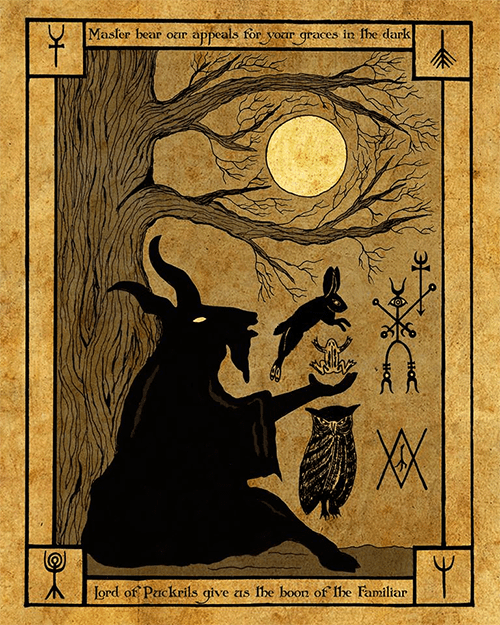
If one doesn’t have a familiar spirit, how would someone gain one? How was it done historically? How can it be done now?
You can hope that the Master who grants the Boon of the Familiar favors you with this special encounter, this special spiritual transformation. Sometimes He (or the other powerful spirits who can do this to humans) will do that to strange-souled people very much without their knowledge, expectation, or even permission. We don’t give “permission” to powerful beings like them, for anything. They do what they want to do. We go along with it, or we tend to end up in bad places.
This offends modern people who have lifted the cult of radical individuality up to the place that the Christian God used to occupy. We can’t handle imagining other beings doing things to us that we didn’t choose or want. We can’t handle imagining that we and our beliefs about our human importance and dignity aren’t at the center of the Cosmic Chart of Important Things.
But the witch or sorcerer was always rare. They were people living on the edges of communities, sometimes (oftentimes) not accepted by communities. They were outsiders, their own souls marked as different or “other.”
A person who is strange-souled (and you’d kinda have to be to want this) can separate themselves further from the comforts of the human world, or the familiarities of humanity, and embark on a quest in the otherness- going to deserted areas, places without humans, places with a lot of other-than-humans, and respectfully asking for the Boon of the Familiar. It would require (in my mind) a meeting with the Master Spirit who does this, and has always done this or bestowed this thing, on human beings.
And He can appear in tons of ways, because no spirit can shift their shape like He can. But there are others beyond him able to grant this boon; it’s just that He’s more associated with doing this for witches in European folklore than any other spirit. And though he comes and goes as he pleases, and can’t be predicted, I’ve seen him in my own life change people. Not often, but it’s happened.
Those people have to make themselves able to receive what he might give. He can’t be impressed in any ordinary sense of the word. You can’t show off or anything; you just have to be strange enough and somehow passive enough to show that you’re willing to be changed, to be used, to be His person, not so focused on yourself or what you want.
Not everyone will get his attention or this boon, no matter what they do. You never can tell. There’s an element of Fateful mystery here. My human co-workers and I have a method we use for people we are hoping to help gain this encounter, and while I think it’s a good method, it doesn’t really matter how “good” or brilliant it is. The ultimate decision is made far beyond our human understanding.
Your craft and pen name is Robin Artisson, which is a historical familiar spirit, sometimes appearing as a proper name and sometimes appearing as classification of spirits. Alice Kyteler, the first recorded person in Ireland to be condemned of witchcraft was accused of having sexual intercourse with her familiar spirit, Robin Artisson, whom was also described as an incubus. Is there a sexual component to familiar spirits?
Yes, absolutely. Sexual union or congress with the familiar in a human shape is not just recorded extensively, but has featured in my own experience and the experiences of others that work with me. What that experience- which occurs in a vivid trance-type visionary or out-of-body lucid condition- “really means” is up for anyone’s interpretation.
To me, it’s obviously not “just sex.” Though it can be enjoyable, it’s not ordinary at all. I think it’s the familiar communicating something deep, endowing the person with some kind of force or gift or transformation, and our minds simply interpret such a deep and intimate thing in sexual terms. We have a clear folkloric motif of human sexual relations with otherworldly beings, and they all seem to cover a reality of deeper transformation being shared from the Unseen with human persons. Thomas Rhymer’s clear sexual relationship with the Fayerie Queen is the best example.
It’s also a very personal matter to everyone I know who encounters it.
Related Articles:
Review: Letters From The Devil’s Forest
Review: DeSavyok Elfhame Tarot (Special Edition)
Beginner Books Recommended By Trad. Craft Witches

